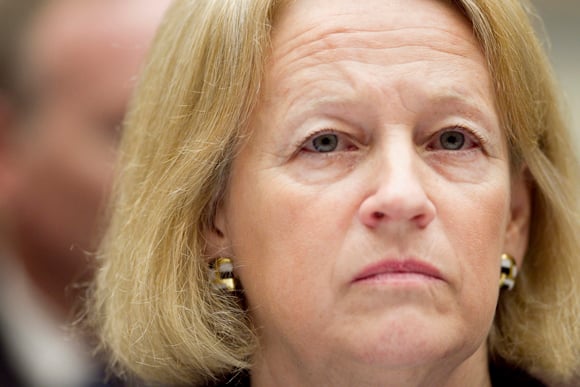SEC chairman stands her ground in testimony before Congress; industry dubs reform 'deadly medicine'
Securities and Exchange Commission Chairman Mary Schapiro told lawmakers Thursday that hundreds of money market mutual funds sponsors have injected their own capital into the vehicles to sustain their value, moves that she said highlight the vulnerability of the funds and underscore the need for further reform.
In testimony before the Senate Banking Committee, Ms. Schapiro said that there have been more than 300 instances of such internal bailouts since money market funds were established in the 1970s.
“There will come a time when a fund will not have either the capacity or the willingness to step in and support the fund — and investors believe that there will be support,” Ms. Schapiro said.
She used the statistics to buttress her argument that money market funds continue to be susceptible to runs such as the one in 2008 that forced the Reserve Primary Fund to “break the buck” — the $1 net asset value return that shareholders are promised.
Ms. Schapiro said that an investor stampede out of a single fund could easily metastasize into a “contagion that spreads quickly” and potentially destabilize the financial system.
“The implications to our economy are very broad and very deep,” she said.
Later in the hearing, an industry executive countered that the capital infusions provided by asset managers to their own funds is a sign of the strength of the $2.6 trillion sector.
“What the support shows is the inherent resilience of the funds,” said J. Christopher Donahue, president and chief executive of the Federated Investors Inc. “It shows a strong dynamic in the industry … to support these products.”
Money fund advocates assert that the SEC's response to the Reserve Primary Fund debacle — promulgating rules in 2010 that increased liquidity requirements for funds and decreased their interest rate exposure — was sufficient.
At the hearing, Ms. Schapiro reiterated that the agency is considering further reforms, such as requiring a floating NAV or imposing capital buffers with redemption restrictions.
“More needs to be done,” she said. “That's because the incentive to run still remains. It is essential that we address this risk now rather than waiting until the middle of the next crisis.”
Ms. Schapiro's desire for more reform has run into a wall of opposition from the industry and members of both parties of Congress. Opponents say that the changes the SEC is considering would undermine the two most attractive qualities of money market funds – their high liquidity and the stable value that they promise investors.
Sen. Patrick Toomey, R-Pa., a staunch reform opponent, suggested that Ms. Schapiro lacks the three votes on the five-member SEC to move forward with a proposal.
“Some [commission members] would tell you that they still have an open mind and want to engage with a document from the [SEC] staff,” Ms. Schapiro responded. “I am hopeful that we will have the debate that I think we need to have.”
In a meeting with reporters after the hearing, Ms. Schapiro declined to speculate on when the SEC might issue a proposal. “We will be working through the issues of the commissioners over the next month or so,” Ms. Schapiro said.
When the proposal does come out, it is certain to generate hundreds — perhaps thousands — of comments. Many of them will be from industry participants who say that the sector is under more threat from the SEC than from a potential run.
“Every one of her ideas destroys the industry by definition, and by money leaving,” Mr. Donahue said in an interview. “What they want to do is give medicine that is deadly to the healthy.”
Ms. Schapiro tried to soothe the skeptical lawmakers by acknowledging the important role that money market funds play for investors and cash managers.
“The goal here is not to demonize the industry,” she said.







